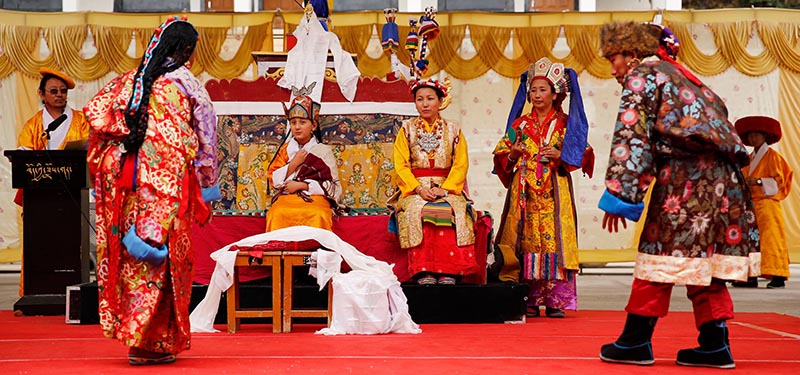PEMA OBAR
In India, a non-Buddhist king is fearful that Sudhana, a wealthy merchant, will eclipse him in wealth. Therefore, the king sends him, in pain of death, on an impossible mission to find a wish-fulfilling jewel far away in the ocean. On the journey, Sudhana’s boat is capsized by nāgas and the whole crew is captured by a race of female cannibals who take them as husbands. Deciding to escape, they ply the cannibals with beer and then flee to a desert to meet with a flying horse who will carry them all to safety. However, with the crew, except for Sudhana, make the fatal mistake of looking back as they fly through the skies on the horse. This causes them to fall, and they are devoured by the cannibals. Sudhana is taken to Tushita heaven.

Meanwhile, Sudhana’s wife miraculously gives birth to a son, who is an incarnation of the great Indian yogi Padmasambhava. As the child grows up, he becomes curious about his father, but his mother does not tell him the truth. One day as he engages in the business of selling yarn with an old woman in a market, she lets slip some information about his father. Pressed to reveal more, she tells him the whole story of Sudhana and his journey.
Meanwhile, the king in his palace sees from afar the yarn in the market and is attracted by its glow. Sending his minister to make inquiries, he learns about the existence of Sudhana’s son. Fearful of him, he sends the boy on a difficult mission to find a special jewel in the ocean. Before Pema Obar leaves, a dākini gives him a powerful mantra, to say in times of danger.
Pema sets out with his crew, and thanks to the mantra, he is able to subdue the nāgas who caused his father so much trouble. The same mantra helps to gain the jewel from the nāgas, and he returns home to his mother.
The king is even more worried and sends him out again, this time to fetch a golden pan from the land of the cannibals. On each of the four stages of the journey he meets a fierce cannibal woman but is able to escape her clutches and even win her friendship and trust with help from the mantra. Finally, he arrives in the land of the queen of the cannibals with her sixty sons. He wins her over with his courage and his mantra and manages to evade the hungry sons. She gives him the golden pan, and through the mantra she is transformed into a beautiful dākinī. Together they fly off to Tibet. On the way, they pick up the other four cannibals, and they too are transformed into dākinīs. Pema also picks up an item from each cannibal land.
Upon Pema Öbar’s arrival back home, the king is even more fearful of him and orders that he be burned in sacrifice on a high mountain. This is done and his ashes are scattered to the winds. The dākinīs go to the place of sacrifice and restore Pema to life. They invite the king and his wicked ministers to fly with them in the gold pan. Taking them over the cannibal lands, they tip the pan and the king and his ministers fall out to become food for the cannibals below. Pema comes down from the mountain and is crowned king.
It is widely accepted that the story of Pema Öbar is an account of a past incarnation of Padmasambhava, as the text itself makes clear.










